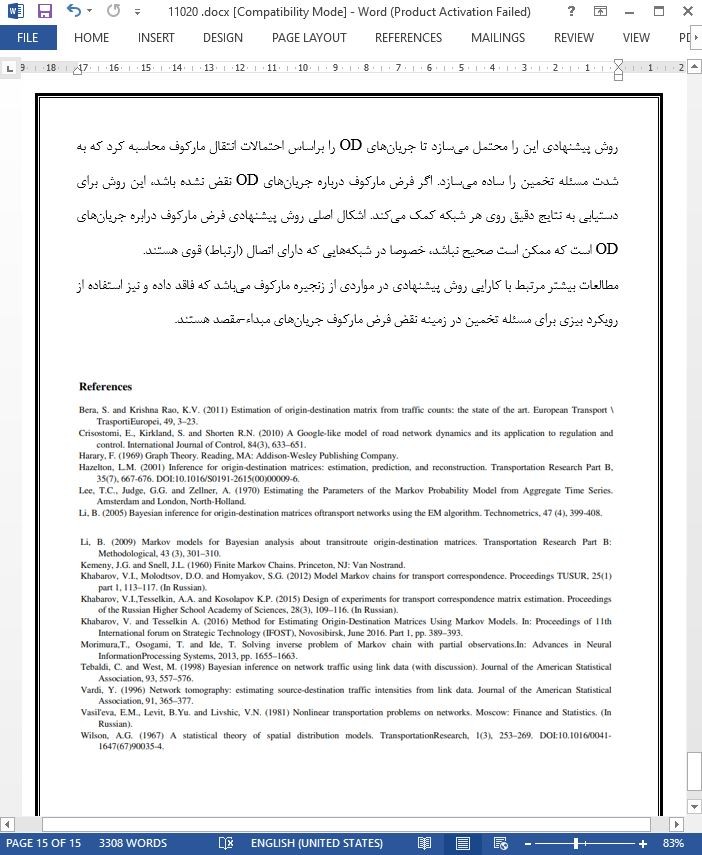
تخمین ماتریس های مبدا-مقصد بر اساس زنجیره های مارکوف
چکیده
روش تخمین ماتریس های تناظر مبداء-مقصد با استفاده از داده های مشاهده ای درباره جریان های ترافیک براساس تئوری زنجیره مارکوف در این مقاله مدنظر قرار گرفته است. این روش مبتنی بر شبکه حمل و نقل که همراه با گراف زنجیره مارکوف مربوطه است و براساس شکل مخروطی گراف پیشنهادی می باشد. طبقه بندی مدلهای مشاهده ای در ارتباط با جریان در یک شبکه حمل و نقل ارائه گردیده است. خصوصیات روش پیشنهادی با در نظرگیری چندین شبکه ساده مورد تحقیق و بررسی قرار گرفتند. توصیه ها برای کاربرد عملی روش پیشنهادی در شبکه های حمل و نقل حقیقی ارائه شده اند.
1-مقدمه
مدل های تعادلی ریاضی جریان های ترافیک به طور گسترده برای پشتیبانی فرآیند تصمیم گیری در مدیریت سیستم های حمل و نقل شهرهای بزرگ، انباشتگی ها، مورد استفاده قرار گرفتند. توسعه این مدلها می تواند به دو مرحله تقسیم شود. مرحله اول برای تخمین ماتریس های مبداء-مقصد (OD) براساس داده های اولیه است. در مرحله دوم، ماتریس های مبداء-مقصد به دست آمده در شبکه حمل و نقل توزیع شدند. المان های یک ماتریس OD عبارت است از تعداد کل کاربران در حال حرکت از یک نقطه شبکه حمل و نقل به نقطه دیگر. مسئله دستیابی به جریان های مبداء-مقصد این است که این جریان ها به طور صریح قابل مشاهده نیستند و ملزم به این هستیم که آنها را به طور غیرمستقیم به دست بیاوریم. روش های مختلفی که وابسته به داده های اولیه هستند، به طور معمول برای تخمین جریان های OD مورد استفاده قرار گرفتند. و تمام این روش ها می توانند به 2 کلاس تقسیم شوند. اولین کلاس شامل مدلهای گراویته و انتروپی توصیف شده توسط واسیلوا و همکاران (1981) و ویلسون (1967) است. مدل گراویته به دلیل تشابه با قانون معروف گرانش مورد استفاده قرار گرفته است؛ مدل انتروپی براساس روش انتروپی (بی نظمی) ماکسیمم استفاده شده است. یک عیب قابل توجه این مدلها این است که آنها با یک تابع مشترک توصیف شدند که پارامترهای این تابع براساس تحرک جمعیت یعنی اطلاعات غیرمستقیم درباره حرکت شهروندان تعیین شدند.
3- نتیجه گیری ها
در این مقاله، روش تخمین ماتریس OD براساس بازنمایی شبکه به صورت یک زنجیره مارکوف پیشنهاد شد. مدلهای مشاهده ای جریان های ترافیک روی شبکه در نظر گرفته شدند. روش تخمین ماتریس OD براساس تجزیه مخروطی ماتریس انتقال زنجیره مارکوف است. اگر مشاهدات به دست آمده بر طبق مدلهای مشاهده ای 2 تا 4 در دسترس باشند، این محتمل است تا روش پیشنهادی برای تخمین جریان های مبداء-مقصد را به کار برد که مرتبط با تخمین احتمالات انتقال غیرمستقیم زنجیره با استفاده از ماتریس بنیادین می باشد.
Abstract
The method of estimating origin-destination matrices of correspondence using observational data on traffic flows based on the Markov chain theory is considered in this paper. The method is based on the transportation network, which is associated with the graph of the corresponding Markov chain and on the canonical form of the graph proposed. The classification of observation models on flows in a transportation network is provided. The properties of the method proposed are investigated on several simple networks. The recommendations for the practical application of the method proposed in real transportation networks are given.
1. Introduction
Mathematical equilibrium models of traffic flows are widely used to support decision-making process in the management of transport systems of large cities, agglomerations. The development of these models can be divided into two stages. The first stage is to estimate origin-destination (OD) matrices based on the initial data. At the second stage the origin-destination matrices obtained are distributed to the transportation network. Elements of an OD matrix area total number of users moving from one point of the transportation network to another. The problem of obtaining origin-destination flows is that they are not explicitly observable, and we have to find them indirectly. Different methods that depend on the initial data are commonly used to estimate OD flows. And all methods can be divided into 2 classes. The first class includes gravity and entropy models described by Vasil’eva et al. (1981) and by Wilson (1967). The gravity model is used by analogy with the famous law of gravitation; the entropy model is based on a maximum entropy method. A significant disadvantage of these methods is that they are described by a common function whose parameters are determined based on the mobility of the population, i.e. the indirect information about movements of citizens.
3. Conclusions
In this paper the OD matrix estimation method based on the representation of the network as a Markov chain was proposed. Models of observation on traffic flows on the network were considered. The OD matrix estimation method is based on a canonical decomposition of a transition matrix of a Markov chain. If observations obtained according to the observation models 2 – 4 are available, it is possible to apply the method proposed to estimate origin-destination flows and, which is connected to the estimation of indirect transition probabilities of the chain using its fundamental matrix.
چکیده
1-مقدمه
2- تخمین ماتریس های OD
2-1- مدلهای مشاهده ای
2-2- روش تخمین ماتریس OD براساس زنجیره های مارکوف
2-3- تحقیق و بررسی روش
2-4- کاربرد عملی
3- نتیجه گیری ها
Abstract
1. Introduction
2. Estimation of OD matrices
2.1. Observation models
2.2. OD matrix estimation method based on Markov chains
2.3. Investigation of the method
2.4. Practical application
3. Conclusions
- ترجمه فارسی مقاله با فرمت ورد (word) با قابلیت ویرایش، بدون آرم سایت ای ترجمه
- ترجمه فارسی مقاله با فرمت pdf، بدون آرم سایت ای ترجمه



